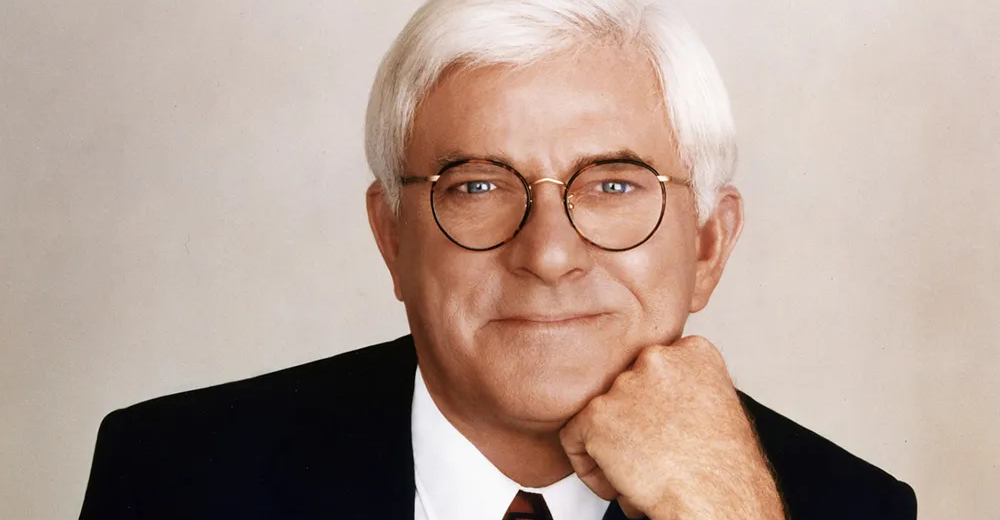Phil Donahue Changed My Life—and Millions of Others
Jeff Cohen

Phil Donahue passed away Sunday night, after a long illness. He was beloved by those who knew him and by many who didn’t.
He started as a local reporter in Ohio, was a trailblazer in bringing social issues to a national audience as a daytime broadcast TV host, and then he was pretty much banished from TV by MSNBC because he—accurately, correctly and morally—questioned the horrific US invasion of Iraq.

Phil Donahue in 1977.
In the 1970s, Phil took progressive issues and mainstreamed them to millions through his syndicated daytime show. He was a pioneer in syndication. He also pioneered on the issues; his most frequent guests on his daytime show were Ralph Nader, Gloria Steinem and Rev. Jesse Jackson. They appeared dozens of times as Phil boosted civil rights, women’s rights, consumer rights. He regularly hosted Dr. Sidney Wolfe, warning of the greedy pharmaceutical industry and unsafe drugs. Raised a Catholic, he also featured advocates for atheism.
Mainstream media obits have predictably had a focus on his daytime TV episodes that included male strippers or other titillation, but Phil was serious about the issues—and did far more than most mainstream TV journalists to address the biggest issues.
I was a senior producer on Phil’s short-lived MSNBC primetime show in 2002 and 2003. It was frustrating for us to have to deal with the men Phil called “the suits”—NBC and MSNBC executives who were intimidated by the Bush administration, and resisted any efforts by NBC/MSNBC to practice journalism and ask tough questions of Washington before our young people were sent to Iraq to kill or be killed. Ultimately, Phil was fired because—as the leaked internal memo said—Donahue represented “a difficult public face for NBC at a time of war.”
But before we were terminated, we put guests on the screen who were not commonly on mainstream TV. We offered a full hour with Barbara Ehrenreich on Labor Day 2002, a full hour with Studs Terkel, congressmembers Bernie Sanders and Dennis Kucinich, columnist Molly Ivins, experts like Phyllis Bennis and Laura Flanders, Palestinian advocates including Hanan Ashrawi.
No one on US TV cross-examined Israeli leaders like Phil did when he interviewed then-Israeli Foreign Minister Shimon Peres, and later, former Prime Minister Ehud Barak. They seemed stunned—never having faced such questioning from a US journalist.

Phil Donahue (right) with Michael Moore—three right-wingers for balance not pictured.
But “the suits” ruined our show when they took control and actually mandated a quota system favoring the right wing: If we had booked one guest who was antiwar, we needed to book two that were pro-war. If we had two guests on the left, we needed three on the right. When a producer suggested booking Michael Moore—known to oppose the pending Iraq War—she was told she’d need to book three right-wingers for political balance.
Three weeks before the Iraq war started, and after some of the biggest antiwar mobilizations the world had ever seen (which were barely covered on mainstream TV), the suits at NBC/MSNBC terminated our show.
Phil was a giant. A huge celebrity who supported uncelebrated indie media outlets. He loved and supported the progressive media watch group FAIR (which I founded in the mid-1980s).
Phil put Noam Chomsky on mainstream TV. He fought for Ralph Nader to be included in the 2000 presidential debates. He went on any TV show right after 9/11 that would have him, to urge caution and to resist the calls for vengeful, endless warfare that would pointlessly kill large numbers of civilians in other countries. He opposed active wars and the Cold War with the Soviet Union. He supported war veterans and produced an important documentary on the topic: Body of War.
Phil Donahue made his mark on our society. He fought for the underdog. He did it with style and grace and a wonderful sense of humor. He changed my life. And others’ lives.
He was inspired by the consciousness-raising groups he saw in the feminist movement, and he sought to do consciousness-raising on a mass scale . . . using mainstream corporate TV. He did an amazing job of it.
A version of this post appeared on Common Dreams (8/19/24) and other outlets.
|
